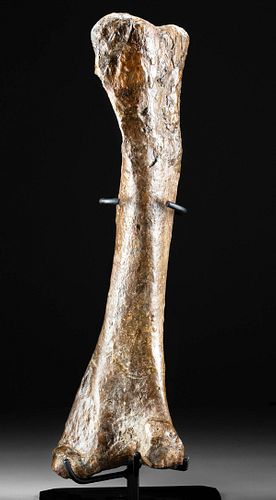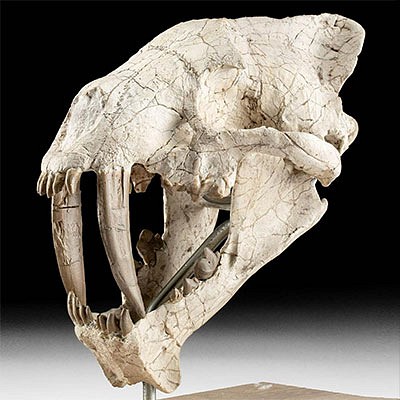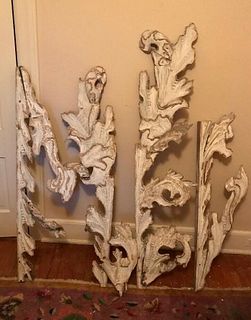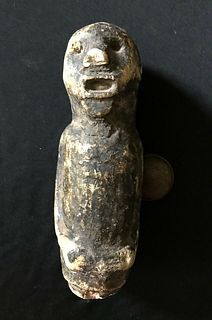Huge & Rare Fossilized Edmontosaurus Tibia Bone
Lot 5
About Seller
Artemis Fine Arts
686 S Taylor Ave, Ste 106
Louisville, CO 80027
United States
Selling antiquities, ancient and ethnographic art online since 1993, Artemis Gallery specializes in Classical Antiquities (Egyptian, Greek, Roman, Near Eastern), Asian, Pre-Columbian, African / Tribal / Oceanographic art. Our extensive inventory includes pottery, stone, metal, wood, glass and textil...Read more
Estimate:
$14,000 - $21,000
Absentee vs Live bid
Two ways to bid:
- Leave a max absentee bid and the platform will bid on your behalf up to your maximum bid during the live auction.
- Bid live during the auction and your bids will be submitted real-time to the auctioneer.
Bid Increments
| Price | Bid Increment |
|---|---|
| $0 | $25 |
| $300 | $50 |
| $1,000 | $100 |
| $2,000 | $250 |
| $5,000 | $500 |
| $10,000 | $1,000 |
| $20,000 | $2,500 |
| $50,000 | $5,000 |
| $100,000 | $10,000 |
| $200,000 | $20,000 |
About Auction
By Artemis Fine Arts
Jul 13, 2021
Set Reminder
2021-07-13 12:00:00
2021-07-13 12:00:00
America/New_York
Bidsquare
Bidsquare : Fauna, Flora, Stones & Bones
https://www.bidsquare.com/auctions/artemis-gallery/fauna-flora-stones-bones-7214
Join us for a very special summer auction featuring fabulous fossils, rocks, and minerals, plus art depicting flora and fauna from antiquity to present day. This is one you won't want to miss! Artemis Fine Arts info@artemisgallery.com
Join us for a very special summer auction featuring fabulous fossils, rocks, and minerals, plus art depicting flora and fauna from antiquity to present day. This is one you won't want to miss! Artemis Fine Arts info@artemisgallery.com
- Lot Description
North America, Montana, Powderville, Powder River, Hell Creek Formation, Cretaceous period, ca. 70 to 65.5 Million years ago. A massive example of a fossilized tibia bone from the exceedingly rare Edmontosaurus (Edmontosaurus anatotitan). The bone is elongated and formed part of a back leg; the narrow end forming the ankle, and the larger knobbed end the knee joint. The tibia, being approximately half the length of the leg, gives a great idea of the sheer size of these dinosaurs. As the name suggests, anatotitan was a titan of a beast; the legs supported a body that could be nearly 35 feet long and weigh over 4 tons. The surface has developed a lovely umber brown hue from the fossilization process. Edmontosaurus were a species of duck billed dinosaur and their name means the "lizard of Edmonton" after the capital city of the province where they were first unearthed. This tibia is one of the largest we have ever seen from this rare dinosaur! Size: 38" L x 11" W (96.5 cm x 27.9 cm); 42" H (106.7 cm) on included custom stand.
This piece has been searched against the Art Loss Register database and has been cleared. The Art Loss Register maintains the world’s largest database of stolen art, collectibles, and antiques.
Provenance: private Rome, Georgia, USA collection
All items legal to buy/sell under U.S. Statute covering cultural patrimony Code 2600, CHAPTER 14, and are guaranteed to be as described or your money back.
A Certificate of Authenticity will accompany all winning bids.
PLEASE NOTE: Due to recent increases of shipments being seized by Australian & German customs (even for items with pre-UNESCO provenance), we will no longer ship most antiquities and ancient Chinese art to Australia & Germany. For categories of items that are acceptable to ship to Australia, please contact us directly or work with your local customs brokerage firm.
#164979Professionally prepared and stabilized with infills and gap fills. Visible break lines and some repair on the knobs. Approximately 95% or more original material. Infills and gap fills with repair. Also some wear on end as expected with aging and fossilization process.Condition
- Shipping Info
-
All shipping is handled in-house for your convenience. Your invoice from Artemis Gallery will include shipping calculation instructions. If in doubt, please inquire BEFORE bidding for estimated shipping costs for individual items.
-
- Buyer's Premium



 EUR
EUR CAD
CAD AUD
AUD GBP
GBP MXN
MXN HKD
HKD CNY
CNY MYR
MYR SEK
SEK SGD
SGD CHF
CHF THB
THB














